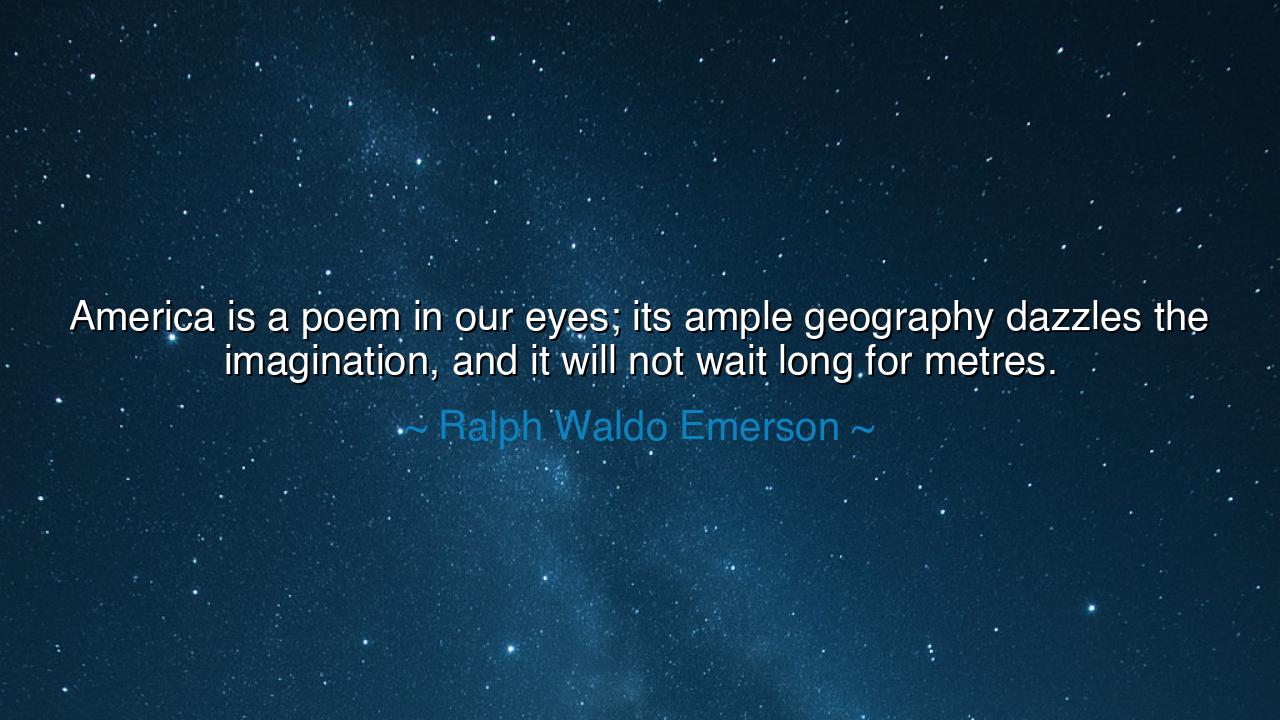
America is a poem in our eyes; its ample geography dazzles the
America is a poem in our eyes; its ample geography dazzles the imagination, and it will not wait long for metres.






“America is a poem in our eyes; its ample geography dazzles the imagination, and it will not wait long for metres.” Thus spoke Ralph Waldo Emerson, the sage of Concord, whose words breathe the spirit of a nation still in its dawn. In this luminous utterance, Emerson reveals that America is not merely a place of borders and buildings, but a living vision, a vast and unfolding poem written by the hands of its people. To him, the land itself—its mountains, its rivers, its skies unending—was a canvas of divine possibility. The imagination of man, when set against this grandeur, could not help but awaken. America was not yet finished, he believed; it was waiting for its poets, its dreamers, its visionaries to give rhythm and meaning to its boundless promise.
This quote finds its origin in Emerson’s essay “The Poet,” written in the year 1844, during the flowering of the Transcendentalist movement. In those days, the nation was young, its spirit restless and unformed. Emerson looked upon this new world not through the eyes of a politician, but through the eyes of a seer. He beheld in its forests and frontiers a metaphor for the human soul—vast, untamed, and radiant with potential. “America is a poem,” he wrote, because he saw in its creation the same mystery that governs the making of art. The poet, he said, does not invent beauty; he reveals it, giving form to what already exists in nature and spirit. So too must a people learn to translate their land, their struggles, their ideals into metres—the harmonies of art, philosophy, and truth.
To Emerson, the geography of America was not merely physical; it was spiritual. Its ample spaces mirrored the expansiveness of the human mind. Its prairies whispered of freedom; its mountains spoke of aspiration; its rivers carried the pulse of renewal. Yet he warned that the land’s beauty would remain mute unless the people found their voice to match it. “It will not wait long for metres,” he declared—meaning that the soul of America demanded expression, that destiny was calling for creators who would give words to its grandeur. The imagination, he believed, was not a luxury but a sacred duty. To see beauty and fail to express it was to deny life itself its rhythm.
History has proven Emerson’s vision true. In the years after his words, America found its poets—Walt Whitman, who sang the vast song of democracy in Leaves of Grass; Emily Dickinson, who gave voice to the hidden infinities of the soul; Langston Hughes, who set the rhythms of Harlem to the eternal music of hope. Each of them heard the land calling for its metres, and answered. They turned the physical landscape into a landscape of spirit, each line of their verse adding another stanza to the great poem of America. Emerson’s prophecy was fulfilled not only in literature but in invention, in music, in the civil movements of conscience—everywhere a rhythm rose from the soil of struggle and imagination.
Yet Emerson’s teaching extends beyond one nation; it speaks to all humanity. Every generation inherits a world unfinished—a poem waiting for its next verse. To live without imagination, to move through life seeing only what is useful or profitable, is to walk upon sacred ground and never look up to see the stars. Each of us stands within a geography of the soul—vast, dazzling, and waiting for expression. The challenge is not merely to exist within it, but to give it meaning, to shape chaos into harmony, to find our metre and sing it into the world.
O listener, remember this truth: the world itself is poetry, and you are one of its lines. You need not be a writer to live poetically; you need only see with wonder, speak with purpose, and create with love. Emerson’s call was not to art alone but to awakening—to live imaginatively, to make of life a work of beauty and moral courage. Whether you build, teach, heal, or dream, you are adding to the poem of humanity. Every act of vision, every gesture of kindness, every pursuit of truth is a verse that will echo beyond your years.
Therefore, let your imagination be bold. Let your life be your poem, and your spirit its rhythm. Look upon your own land—whatever soil, whatever city, whatever corner of the earth you call home—and see it with Emerson’s eyes: not as something to be used up, but as something to be sung. For the world, like America in Emerson’s day, is still new; it is still waiting for those who will give it voice. And when you rise to that calling—when your own soul finds its metre—you, too, will have become part of that eternal poem that dazzles the imagination of all who dare to see.






AAdministratorAdministrator
Welcome, honored guests. Please leave a comment, we will respond soon